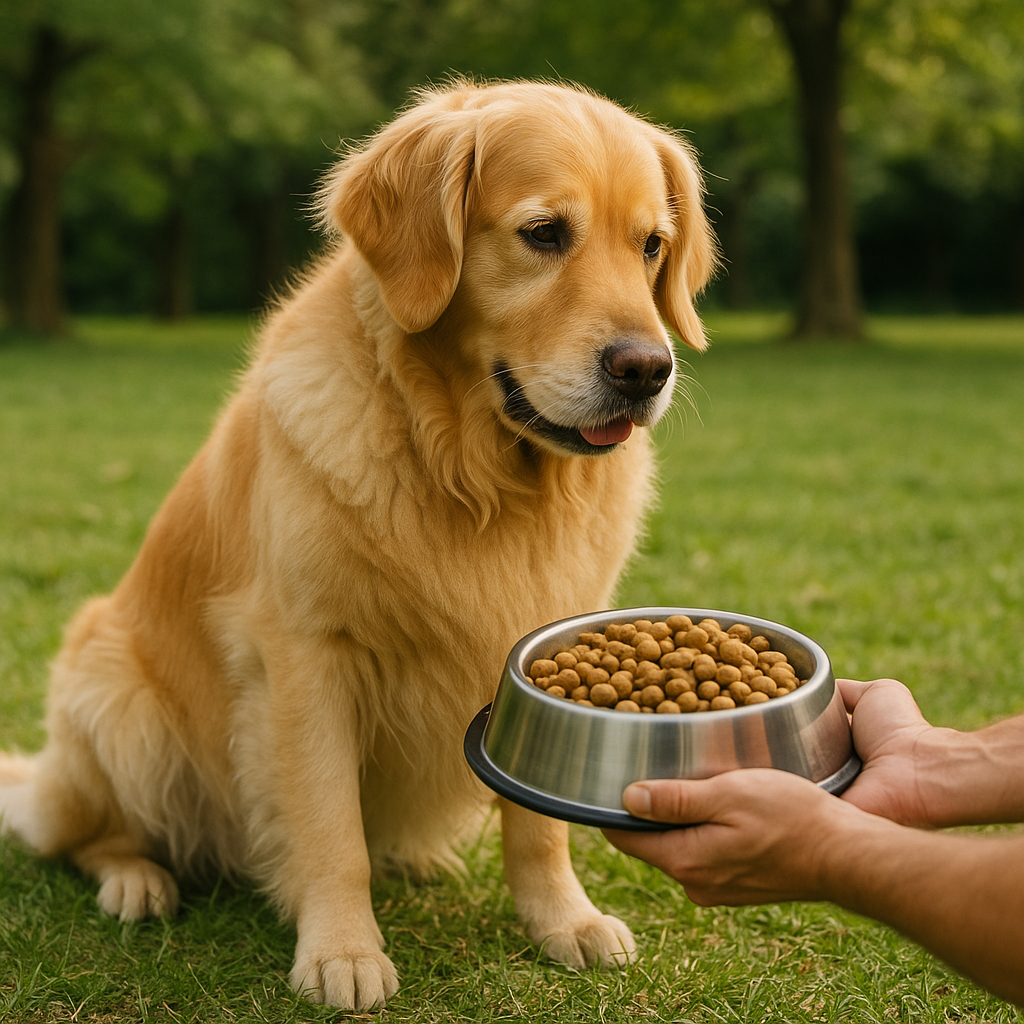Golden Retrievers are known for their friendly personality, loyalty, and love of food—but that love for snacks and treats can sometimes turn into a serious health issue: obesity. Extra weight in Golden Retrievers isn’t just a cosmetic concern—it increases the risk of joint issues, heart disease, diabetes, and a shorter lifespan.
In this article, you’ll learn how to recognize the signs of obesity, what causes it, and most importantly—how to prevent and manage it to keep your Golden healthy and active.
Why Golden Retrievers Are Prone to Obesity
While any dog can become overweight, Golden Retrievers have a few traits that make them more likely to struggle with weight.
Contributing Factors:
- Food motivation: Goldens love to eat, and they’ll rarely say no to a treat.
- Genetics: Some lines are predisposed to gaining weight easily.
- Joint sensitivity: Limits their activity if already overweight.
- Low activity households: Not getting enough exercise can lead to weight gain.
- Free feeding or overfeeding: Too much food or poor portion control.
Even if your Golden looks “fluffy,” they may already be overweight or heading in that direction.
How to Tell If Your Golden Is Overweight
Visual checks and touch are good first steps.
Use This Checklist:
- Can you feel ribs easily with light pressure?
- Does your dog have a visible waistline from above?
- Is there a tuck behind the ribcage when viewed from the side?
- Do they get tired quickly or resist exercise?
If the ribs are hard to feel, and the waistline isn’t visible, your Golden may be overweight.
For accuracy, consult your veterinarian to determine ideal weight based on age, size, and gender.
Ideal Weight for Golden Retrievers
General Guidelines:
- Males: 65–75 pounds (29–34 kg)
- Females: 55–65 pounds (25–29 kg)
These are general ranges. Muscle mass, body frame, and health condition also matter.
Tips to Prevent Obesity in Golden Retrievers
1.
Measure Food Accurately
Eyeballing portions often leads to overfeeding.
- Use a measuring cup or a digital scale.
- Follow your dog food label’s feeding guide based on weight and activity.
- Adjust intake if your dog becomes less active or gains weight.
2.
Feed High-Quality, Balanced Food
Choose foods with:
- High protein and moderate fat
- Low fillers like corn or by-products
- Added joint support (glucosamine, chondroitin)
- Omega-3s for inflammation and coat health
Avoid calorie-dense or low-quality commercial foods.
3.
Limit Treats
Treats should be no more than 10% of daily calories.
- Choose low-calorie options like carrots or green beans.
- Use treats for training—not out of guilt or boredom.
- Avoid table scraps and human snacks.
4.
Create a Consistent Feeding Schedule
- Feed your dog twice a day, at the same times.
- Avoid free-feeding or leaving food out all day.
- Consistency helps regulate digestion and hunger cues.
5.
Exercise Daily
Golden Retrievers need at least 1 hour of activity per day.
Try:
- Brisk walks
- Fetch
- Swimming
- Hiking
- Tug-of-war
- Dog agility or scent games
Adjust intensity based on age and fitness level.
6.
Keep Them Mentally Stimulated
Bored dogs often overeat or snack unnecessarily.
- Use puzzle feeders or slow bowls
- Teach new tricks
- Rotate toys
- Incorporate scent games or hide-and-seek
Mental activity can be just as tiring as physical activity.
7.
Track Their Weight
Keep a weight log and monitor body condition monthly.
- Use a pet scale or weigh-in at the vet
- Watch for gradual changes
- Snap monthly side-view photos for comparison
Early intervention is easier than trying to reverse long-term weight gain.
When to Talk to a Vet
See your vet if:
- You notice sudden or excessive weight gain
- Your dog struggles with mobility
- You’re not sure how to reduce calories safely
- You want to try a prescription weight-loss diet
Your vet can rule out underlying conditions like hypothyroidism or arthritis.
Common Mistakes to Avoid
- Feeding based on the bag’s “maximum” recommendation
- Using food to soothe behavior problems
- Letting treats become a substitute for attention
- Ignoring small weight gains that turn into big ones
Prevention is always easier than treatment.
Final Thoughts: A Healthy Golden Is a Happy Golden
Obesity can quietly reduce your Golden Retriever’s quality of life—but it’s 100% preventable. By staying aware of portion sizes, feeding nutritious food, and keeping your dog active and engaged, you’re setting them up for a longer, healthier, and more joyful life by your side.
Remember, showing love isn’t about giving more food—it’s about giving them a body that feels good to live in.

